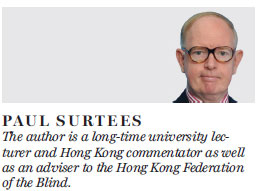More care for others is needed by people in Hong Kong streets
Updated: 2016-06-21 08:07
By Paul Surtees(HK Edition)
|
|||||||||
Newcomers to Hong Kong often comment on the following paradox. This is a teeming but very compact city, with many downtown pavements, shopping centers and transport facilities packed with crowds. You would expect that, because walking through congested places is nothing new to most of them, a higher proportion of our locals would be more adept at negotiating crowded places without causing inconvenience or upset to other pedestrians. But not so - many newcomers to Hong Kong tell me that they are shocked to experience here someone bumping into them, even if the newcomer is standing still at the time, with never an apology from the bumper! That is a common experience here. It is but one aspect of a larger problem, which will be reviewed here.
Hong Kong people are respected as generally being very hard-working. This also means that many are in a hurry, and perhaps stressed by their busy workloads. This hurry is exhibited by many people rushing to get into a crowded lift, before giving those inside the chance to alight at their floor. A similar rush to enter can be too often seen as boarding MTR train passengers push and jostle their way into an overcrowded carriage, before giving those inside any opportunity to get out at their station. And that is despite almost constant MTR loudspeaker requests for people not to do that. Having the basic courtesy and patience to wait for a few seconds before boarding a lift or train carriage would make negotiating them easier for everybody.

It seems that these days, the "uniform" for many young people includes carrying a hefty backpack, while being made insensate to all that is going on around them by being constantly plugged in to smartphones. When moving, they seem totally unaware that their backpack projects well beyond the space taken up by their body, and as they turn they often strike another passenger or pedestrian with the backpack. They are unaware of this, and of course they can hear nothing of the collision because they can hear only what comes out of their earphones. More care for others nearby is clearly needed by backpack wearers.
Then there is the use of an arm to point to something in the street. Pointers often ignore other pedestrians, who have to swerve to avoid the outstretched arm. Swerving becomes a common method of perambulating Hong Kong's streets, because so many people walk around while reading or texting on their phones, which makes them walk in a way that is completely oblivious of other pedestrians, who are forced to swerve to avoid bumping into them. Such a totally self-absorbed style of walking is proving to be a hazard to others, particularly the elderly, infirm, disabled or blind. More care and attention to their own movements and to others near them on the part of smartphone users would help to avoid many a collision in crowded places.
The smartphone-obsessed walker will often unexpectedly stop dead, even in a doorway or at the top of a flight of stairs or escalator, causing inconvenience and even a pedestrian bottleneck. Saying "excuse me" to such people whom you would like to pass does not help, because their auditory sense is focused solely on their earphone chat or music - so they cannot hear you! A greater level of awareness from smartphone users to the movements of other people would not only create a more pleasant environment, it would also make everybody safer in congested areas.
An especially irritating walking formation is a V-shape, where groups of friends or family members position themselves like a flock of geese on the wing, thereby blocking the movements of everyone else on that crowded pavement. It is impossible to pass them from behind and oncoming pedestrians are forced to the side of the pavement, or into the gutter, by their maintaining this military flight-like pavement formation!
There is a saying that is pertinent here: "Those living in glass houses shouldn't throw stones." Some Hong Kong residents are quick to complain about the public conduct of some visitors from the north. However, bearing in mind all the shortcomings of our own public conduct delineated above, are we really in any position to complain? Rather, we had better raise our own public walking conduct to a more seemly level, before we accuse others.
Improvements can only come from a combination of family and school teachings to be more considerate of others. Let us hope that our conduct when perambulating this overcrowded city can soon reach international standards - and thereby contribute toward Hong Kong's aspiration to be regarded as Asia's world city.
(HK Edition 06/21/2016 page10)